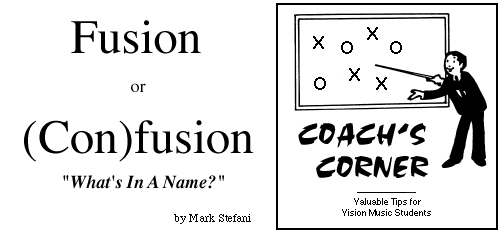
In almost every musical conversation someone participates in nowadays, labels are tossed about so liberally it's enough to make your head spin! Maybe I'm just old-fashioned, but it seems as though definitions of style in the music world were much easier to relate to in the "good old days". Who knows? It could just be a reflection of our society's evolution, and our seeming "need" to label something in order to relate to it. One thing's for certain, though. Everyone's got a different way of defining what they hear, and their opinions, viable or not, tend to be strongly related to those definitions.
Now, no matter where someone is coming from, I can generally get the idea when they refer to an artist, band, or song by a common name. Obviously, terms like blues, rock, jazz, or even classical are very broad. There's literally a world of variations within each. But just add a few adjectives like "Chicago" or "Delta" before blues, "Oldies," "Retro," "Grunge," or "Alternative" in front of rock, "Dixieland," "Swing," or "Bebop" before jazz, and "Baroque," "Romantic," or "Modern" before classical, and you've brought a lot more color into those definitions. It's also very common to hear or use a label specific to another artist, band, or song.
So then, what's the deal with "Fusion?" Musicians and listeners have used that term for years, but I've come to realize that this label can lead to a lot of "con-fusion" (hence the name of this article) when trying to accurately describe something. I guess, given the way that most would try to define the term, the word confusion might be a pretty decent substitute anyway. People generally associate fusion with "progressiveness" or "modern," "electronic," "dissonant," etc. Unfortunately, those traits often permit a substantial amount of inferior artists and compositions to gain respect among an audience that can be somewhat confused as well. Of course, good music will remain good music, and over the course of time true artistry will usually receive its due.
So what does all of this mean to you and I? Well, for me personally, fusion is exactly where I want to be. But my definition of the word is broader, yet simpler, than the one that I cited above. I mean, isn't fusion literally what it means? That is, a fusing or blending of two or more elements? In that scenario, you could make a case for almost everything that you hear being a fusion of sorts, especially in this day and age. As a matter of fact, it's pretty rare to find a successful artist/innovator who isn't an amalgamation of other styles.
If you're a little like me, you want to find a special musical "niche" for yourself. How? Absorb as much as you can from as many different sources as you can. Some knowledge, if not mastery, of another style or instrument will make you a much more interesting artist in the style that you primarily are associated with. Don't just listen and learn from other guitarists. Much of what I feel is a little different about myself deals directly with the strong impact of many pianists, saxophonists, bassists, and other instrumentalists on my guitar work. It's pretty amazing how many doors open up when you try to fuse or blend something from another instrument or style into what is considered "traditional". Despite the disdain that players often have for labels, fusion just might be the best one!
"Coach's Corner" is an ongoing addition to Vision Music. The purpose of these brief articles is to share philosophy, offer practical insights, and to enhance your musical studies.
For the "ultimate" guitar and bass experience...